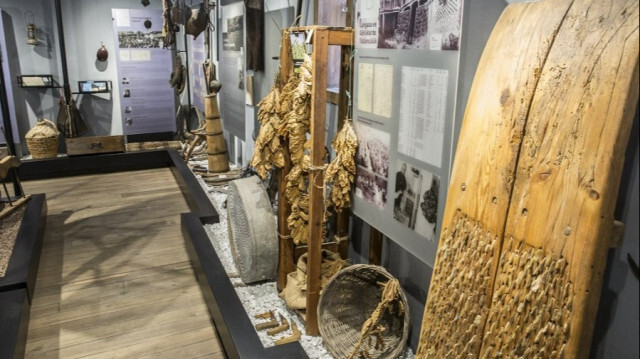
Items preserved from 1923 population exhange of Turkish-Greek population gathered in museum
An electronics repairman from northwestern Türkiye has significantly contributed to preserving the heritage of the population exchange between Türkiye and Greece.
Bayram Akinci, 69, made donations to the Gorukle exchange house to help preserve and pass down items used by those who arrived in the city and those who left during the exchange.
As part of the Türkiye-Greece population exchange agreement on Jan. 30, 1923, included in the Treaty of Lausanne, approximately 34,000 people came to Bursa between 1924 and 1933. Of the number, 14,000 were settled in central Bursa and its villages, while 20,000 were settled in the districts of Orhangazi, Mustafakemalpasa, Mudanya, Karacabey and Gemlik.
Those who came, who shared hardships and joys with each other and the local population, made a living and left behind fond memories. They left their children and grandchildren a legacy of memories, traditions and belongings.
Located in the Gorukle neighborhood, the restored two-story building, originally belonging to Greeks, houses hundreds of items donated by the children and grandchildren of the exchangees.
These include agricultural tools, kitchen utensils, clothing and household items used by Turks who came from Greece and Greeks who moved to Greece.
The museum also showcases items from Bayram Akinci, a second-generation exchangee, including his mother's dough trough, kitchen utensils, wall clock, radio, his father's weapon, grandfather's shoes, and historical documents belonging to his family.
Akinci, one of the museum's founders, told Anadolu that his father from the Serez region of Greece and his mother from Kavala arrived in Bursa by ship via Thessaloniki during the exchange period.
Recounting his childhood filled with stories of the exchange, Akinci said, “We grew up hearing about their hardships. We even experienced some of that scarcity ourselves.
"We have a family photo where my sister, mother, father, and brother are present. My brother wore my sister's dress in the photo. Can you imagine? There was nothing. Because we grew up with their stories, we still call that place ‘homeland.' They called it ‘homeland' and never saw it again,” he added.
Emphasizing the importance of passing down emotions and memories to future generations, Akinci stated that he collected various items, from agricultural tools to kitchen utensils and clothing, to recreate the living environment of that time for everyone to see.
Akinci added that he visited his ancestral home in Serez for the first time in 2003, where he saw his family's house and the graves of his ancestors.

